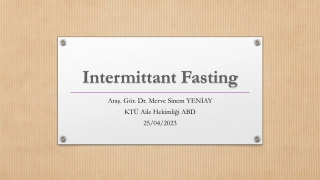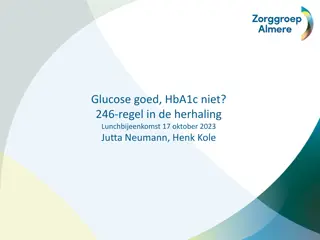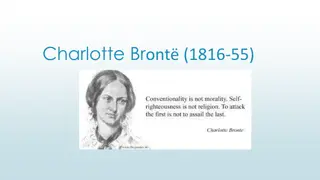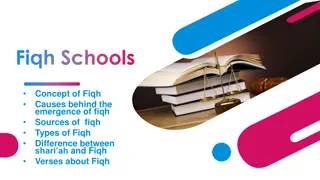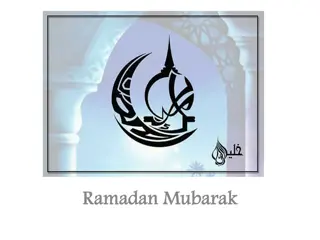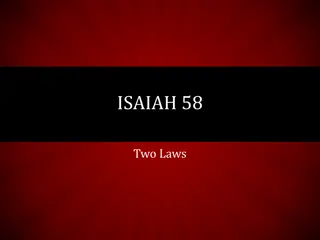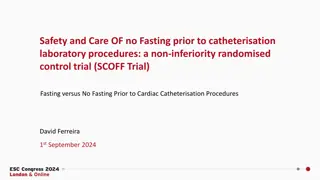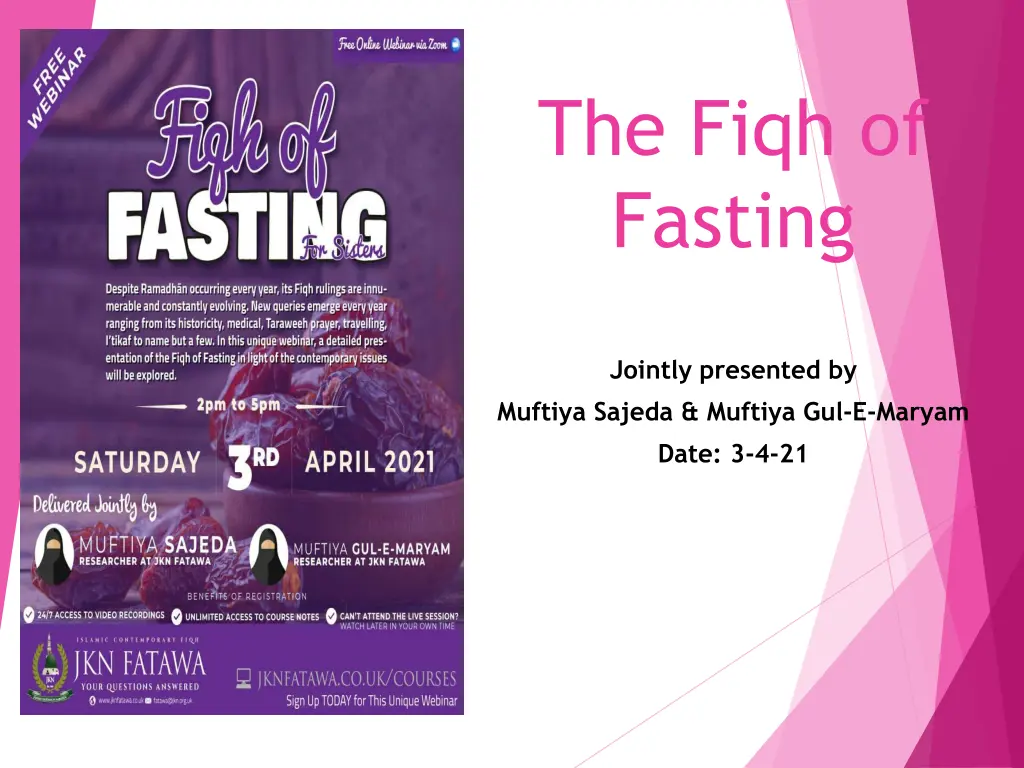
Understanding the Fiqh of Fasting
Explore the essential aspects of fasting in Islam, including rules, meanings, and significance. Gain insights into the correct application of fasting practices and the importance of studying Fiqh for a valid and accepted fast.
Download Presentation

Please find below an Image/Link to download the presentation.
The content on the website is provided AS IS for your information and personal use only. It may not be sold, licensed, or shared on other websites without obtaining consent from the author. If you encounter any issues during the download, it is possible that the publisher has removed the file from their server.
You are allowed to download the files provided on this website for personal or commercial use, subject to the condition that they are used lawfully. All files are the property of their respective owners.
The content on the website is provided AS IS for your information and personal use only. It may not be sold, licensed, or shared on other websites without obtaining consent from the author.
E N D
Presentation Transcript
The Fiqh of Fasting Jointly presented by Muftiya Sajeda & Muftiya Gul-E-Maryam Date: 3-4-21
AGENDA OF THE WEBINAR 2:00- 2:05pm Introduction to the Course and JKN Fatawa Department Session 1: Meaning of Fasting and Rules that break and don t break the Fast Mufti Abdul Waheed Muftiya Gul-E- Maryam 2:05-3:00pm 3:00-4:00pm Session 2: Pregnancy, Menstruation, Taraweeh & I tikaf. Break 10 mins Muftiya Sajeda Badat Muftiya Sajeda & Muftiya Gul-E- Maryam 4:10-4:55pm Session 3: Common Question & Q&A 4:55pm Concluding Remarks Mufti Abdul Waheed 5:00pm End of Webinar
Session 1: Meaning of Fasting and Rules that break and don t break the Fast Muftiya Gul-E-Maryam
Introduction The meaning of fasting Kaffarah (penalty) and Qadha. Concessions around the permissibility to invalidate one s Fast or to postpone the Fast. The rules of Taraweeh Salah. Some rules of I tikaf Some Common Questions Q & A
What is the Fiqh of Fasting Fiqh means a deep understanding of something with its correct application Fiqh of Fasting means understanding the legal injunctions pertaining to Fasting with its correct application.
Why Study the Fiqh of Fasting? To ensure that our Fast is valid and accepted by All h. It is mandatory for the Mukallaf (legally commissioned person) to acquire knowledge of his/he Faraidh (obligations). Helps us to understand the real meaning and correct manner of Fasting.
Definition of Fasting Im m Qudoori (ra) has defined Fasting as; Fasting is to refrain from eating, drinking and intimate relationship during the day (from the crack of dawn up until sunset) with the intention made. (p. 52)
Meaning of fasting A month of reconnecting with Allah and strengthening one s imaan. Ramadhan teaches patience and sympathy. Most beloved month to Allah- revelation of the Quran. Every nafl act is elevated to the reward of a fardh Every fardh is increased in reward 70 times. First 10 days- Mercy, Middle 10- Forgiveness and Last 10- Emancipation from the fire of hell.
The Five Golden Principles Relates to what area the food or agent reaches. - Throat, stomach, intestines. If food/agent reaches these 3 areas the fast is broken. Qualified Cavity Pathway that leads to any of the above qualified cavity. Mouth and nose lead to the throat Anus/rectum lead to the intestines. Abdominal injury leads to the stomach Qualified Passage
The food/agent is of a nourishing source or not. Inhaling smoke intentionally, Intentionally swallowing a bead, stone etc, Intentionally inhaling avoidable substances break the fast. Qualified Agent The settling and absorption of the food/agent. Hence, anything inserted into the throat and immediately drawn out does not break the fast provided no remnant of it remains. Qualified consequences
Dont invalidate the fast despite of the above points; Forgetfulness, Arduousness (i.e. fumes, vapour, dust, saliva, mucus) The following not excused: Necessity, ignorance, accident, coercion, sleep (unconsciousness). Only Qadha is necessary. Qualified Excuses
Qualified Agent - food Qualified Passage Mouth and nose Qualified Cavity - Throat Qualified Cavity stomach in which the agent settles Qualified Cavity - intestines Qualified Passage Anus/rectum
8. Invalidation of Ones Fast That which Necessitates Qadha only. That which Necessitates both Qadha and Kaffarah Kaffarah is a penalty a person must give as a expiation for the crime Qadha means to make up the number of Fasts missed Kaffarah becomes necessary if; 1. Someone to intentionally eat or drink that which is naturally nourishing. 2. Someone to intentionally have intimate relationship in the vaginal or the anal passage. 3. Someone intentionally drink medication without necessity All of the above are considered a crime which necessitate a penalty.
Invalidators of Fast Those factors Necessitating Qadha only To intentionally eat or drink something which is not naturally nourishing. Ejaculation without intimate relationship e.g. Masturbation, kissing one s spouse etc. To intake medication due to a genuine reason.
A Fasting person who becomes unconscious for a few days then apart from the first day, the remaining days he must do Qadha. To intentionally vomit a mouthful. To intentionally return the vomit back onto the stomach, whether small quantity or large. Using an asthma inhaler. Using a nose spray.
To eat or drink accidently To eat deliberately after eating, drinking, vomiting unintentionally or having intercourse out of forgetfulness assuming that the Fast broke. A person eats assuming that suhoor has not ended or iftar has begun but the reality was the contrary. To intentionally allow (or inhale) smoke or dust to enter the mouth. To intake smoke into the nostrils intentionally Having an intimate relationship whether from the vaginal or anal passage. Penetration intentionally incurs both qadha and kafarrah whether or not ejaculation or orgasm takes place.
Example of invalidating the fast A fasting individual has been called for an endoscopy, during the examination a lubricant is placed on the camera for ease in swallowing. In this case the fast is broken due to the lubricant settling in the throat/stomach. Medication that is inserted directly into the rectum breaks the fast due to leading to the intestines. Sniffing medicine where it reaches the throat invalidates the fast.
Case study In Ramadhan Zainab was performing wudhu, whilst excessively pouring water into her nose. She felt it trickle down her throat. Does her fast remain valid? What do you think?
What is the Penalty? To emancipate a slave (NOT APPLICABLE TODAY), BUT if unable to do so the, a) To Fast for 60 days BUT if unable to do so then, b) To feed 60 poor and destitute people; c) i) The poor person is the one who is eligible for Zak t. ii) One must give each poor person the equivalent amount of Sadqatul-Fitr, or feed him two meals a day. iii) It is also permissible to feed one poor person two meals per daily for sixty days, or to give the value of Sadqatul-Fitr each day for sixty days. Note:To feed one poor person in one day two meals equivalent to sixty days will class will class as one day only.
Non-Invalidators of the Fast To eat, drink or have intimate relationship forgetfully. To ejaculate/orgasm whilst having a wet dream To apply oil or surma Smoke to enter the mouth unintentionally. Vomiting unintentionally even a mouthful. To swallow something stuck between your teeth that is less than a chickpea in quantity. Cupping Wet dream
Acupuncture Contact lenses Deodorants/lotions Extracting blood Injections Lip balm/makeup Mouthwash/toothpaste-depending on if it is swallowed Vaginal examination/smear test Medicine/oil in the ears
Example of non invalidators A fasting women attended a smear test/vaginal examination. Her fast remains valid due to the swab not reaching the qualified cavity. Passive smoking does not invalidate the fast, due to it being unavoidable smoke. Applying eye/ear drops do not invalidate the fast, due to them not reaching the qualified cavity of the throat..
Case study During the first few days of Ramadhan Sarah was cooking, she forgetfully tasted and swallowed the food she had made, only realising a few minutes later. Is her fast broken? What do you think?
Miscellaneous Disliked acts of Fasting To chew something unnecessarily without swallowing it. Using toothpaste. To kiss or come into contact with one s spouse without self-control. Gathering saliva to quench the thirst To do anything that weakens the person.
Session 2: Pregnancy, Menstruation, Taraweeh & I tikaf. Muftiya Sajeda Badat
Menstruation and Fasting A menstruating woman or a woman on nifaas is not allowed to fast during Ramadhan. She should not do imsaak which means to assimilate a fasting person by refraining from eating and drinking throughout the day. She can eat during the day however she should be cautious of eating in front of people that are fasting. The missed fasts must be made up after Ramadhan. If someone starts their period anytime during the fast, even if it is just before maghrib, the fast will become invalid. They will have to make up for that fast. This person is allowed to eat after her period has started. EXAMPLE: Maghrib is at 7:56pm, Saleha uses the bathroom at 7:50pm and sees her period has started. The fast she kept will now be invalid.
If someone finishes their period during the day, they should not eat for the rest of the day. EXAMPLE: Maryam has finished her period at 2pm. Maghrib is at 8pm. She should not eat or drink for the rest of the day. However this day will not be counted as a fasting day. If someone has completely finished their period before subha sadiq, but has not been able have a bath before subha sadiq, they should do niyyat of the fast, and then take a bath. EXAMPLE: Zohra has completely finished her period at 1:00 am. Subha Sadiq is at 1:24am. She has not had a bath yet. She should have sehri, do niyyat of fasting and then have a bath. Thereafter pray fajr. Please note the ghusal should not be delayed any further as there is a possibility of missing fajr.
Case Study Yasmin has a normal habit of 7 days of period. In Ramadhan generally she tends to bleed less. On the 5th day she has not bled for 6 hours she decides to have a bath . She keeps a fast on the 6th and 7th day. However on the 8th day she sees blood again. Are the fasts she kept on the 6th and 7th valid? What has happened to her bleeding habit?
Pregnancy, Breastfeeding and Fasting A pregnant or breastfeeding woman has a concession not to fast. However if she is able to fast without causing harm to herself or the foetus then she is encouraged to fast. If a pregnant woman has to break her fast due to her pregnancy then she is allowed to do so. She will only have to do qadha. Kaffarah will not be necessary.
Examples Zainab kept 10 fasts for Ramadhan, she was fine whilst fasting. On the 11th fast she found out she was pregnant. She should carry on fasting until she genuinely feels that fasting is going to harm her baby or her. Hafsah is 5 months pregnant. She is fasting but has not had any severe side effects from fasting. In her previous pregnancy she did fast the full Ramadhan, she did find them hard, however she did not face any major issues and had a healthy baby. She should carry on fasting until she genuinely feels that fasting is going to harm her baby or her.
Taraweeh Salah Taraweeh is Sunnatul-Mu akkadah consisting of twenty rak ats. It must be read after the Esha Sal h without Esha Sal h Taraweeh is invalid. It is best for women to read Taraweeh salah at home. An old woman who is struggling with standing up and praying her taraweeh will be allowed to pray sitting down.
Twenty Rakaats is the Sunnah The people of knowledge have differed concerning the number of Rak ts of Tar weeh performed during Ramadh n. Some have asserted to be forty- one Rak ts including the Witr. This was the opinion of the people of Madeenah and their practice. However the opinion of the majority is twenty Rak ts of Tar weeh and this opinion is in line of the narrations of Sayyidun Ali , Sayyidun Umar and other companions. This is also the opinion of Sufy n at-Thawri, Abdull h Ibn Mub rak and Im mSh fi ee. In fact, Im mSh fi eestates, I found the people of my city, Makk h performing twenty Rak ts. Im mAhmad v states, There are various reports to be found concerning Tar weeh but no exact number to be confirmed. Ish qstates, We performed forty-one Rak ts according to the narration of Sayidun Ubay Ibn Ka b. (Tirmizi) Ibn Rushd states, Im mM lik (in one opinion) along with Im m Abu Haneefah, Im m Sh fi ee , Im m Ahmad and D wood az-Z hiri prefer twenty Rak ts to be performed in Ramadh n excluding the Witr. Ibnul Q sim reports from Im mM lik that he preferred thirty-six Rak ts with three witr. (Bid yatul Mujtahid)
Itikaf For Women I tik f means to seclude oneself in the Masjid/ area of prayer. There are four condition for I tik f to be valid; a) To remain in the Masjid/Room. b) To make the intention of I tik f c) To be pure from major impurity e.g. Janabat. d) To Fast There are three types of I tik f; a) Wajib b) Sunnat c) Nafil
Itikaf For Women I tik f is sunnah in the last 10 days of Ramadhan. ( From Maghrib on the 20th fast until the moon has been sighted for eid.) It should be performed at home, in the specific room /place where a woman normally reads her salaah. If a woman has no specific place at home for her salaah then she should designate a room for her I tik f. (A place where she can comfortably eat, sleep and pray. It should not be very big) Example: Aisha starts secluding herself in her room all day to pray. However she made no intention of I tik f when she started. Her I tik f is not valid.
A menstruating woman can not do Itikf. If a woman starts her menses during I tik f then she will quit her I tik f and do qadha of one day of I tik f Example: Fatima wants to do I tik f however she knows on that on the 25th of Ramadhan she will start her period. She can do nafl I tik f for 4 days. Example: Aisha started her I tik f, however on the 27th of Ramadhan at zuhr time she started her period. She will quit her I tik f and later on do qadha of one day.
Things that break the Itikaaf To leave the designated area without a valid reason even for a slight moment will break the I tik f. A valid excuse would be: To answer the call of nature or for fardh ghusl. Food and drink should be brought to her. If she lives alone then she will be able to leave the room to get food. There is a potential threat in staying in that place.
Sexual intercourse will render the Itikf void whether it is done intentionally or by mistake. Kissing, cuddling etc will break the I tik f if it leads to ejaculation. If it does not lead to ejaculation then it will not break the I tik f, however it is something that should be avoided. If the Fast breaks the I tik f will also break. E.g. eating, drinking etc EXAMPLE: Zainab kissed her husband during one of the nights of the I tik f, it did not lead to ejaculation. Her I tik f is not broken, however her act is not recommended. Note:In the case where the I tik f breaks, only one day of Qadha is necessary with a Fast.
Case Studies Fatima lives with her husband. Whilst in I tik f she went to answer the phone and the door. It was a parcel delivery or the next door neighbours sending food. Maryam is 7 months pregnant, she has attempted fasting however she fainted whilst doing so. Her doctor has told her fasting is harming her. She should not fast. She has taken the advice on board and stopped fasting. She decides to do I tik f.
Intimacy and Fasting If someone was to have intercourse through forgetfulness then the fast will not be break. (Please note forgetfulness and by mistake are completely different.) If someone was to have intercourse intentionally and knowingly then the fast will be broken. Both qadha and kaffarah will be necessary. EXAMPLE: It is the first of Ramadhan, Sumayya and her husband completely forget it is Ramadhan and that they are fasting. They have intercourse, during this it does not cross their mind at all that they are fasting. Then their fast will not break.
Hugging or kissing which leads to absolutely nothing further will not break the fast. If kissing results in swallowing the other persons saliva then this will break the fast. Both qadha and kaffarah will be necessary. Example: Zainab hugs her husband in a loving non sexual way, she also pecks him on the cheek. She knows this will definitely not lead to anything further, as per her thoughts it does not go any further. Her fast has not broken.
If someone was to ejaculate through physical stimulation like hugging or kissing then the fast will break. If someone was to ejaculate through non physical stimulation like a wet dream, or just by looking at their spouse then the fast will not break. Example: Aisha and her husband are hugging whilst fasting, her husbands ejaculates however she does not ejaculate but she releases madhi. Aisha s husband will need to do qadha and have a ghusl. Aisha has not broken her fast however she will need to do wudhu again.
Having an orgasm without ejaculation and intercourse will not result in the fast breaking. Having an orgasm with ejaculation will result in the fast breaking. If no intercourse was involved then only qadha will be necessary. When a woman ejaculates she will release seminal fluid which is yellow in colour. Example: A person is masturbating (not allowed in Islam), he has an orgasm however he stops himself from ejaculating then his fast will not break.
CASE STUDY A woman and her husband are touching each other whilst fasting. They know that this may lead to intercourse. They try to the best to avoid it however they can not control themselves and end up having intercourse. This was done whilst they were aware they were fasting. What is the ruling?
Break for 10 minutes
Session 3 Common Questions and Q & A
Most Common Questions Q1: If a person intends to travel abroad during mid- day, can he break his Fast before travelling? A: No it is not permissible as he is still a resident. If he does then both Qadha & kaffarah become necessary. Note: If a Musafir breaks his Fast deliberately then only Qadha is necessary.
Q2: If someone deliberately broke multiple Fasts in the same Ramadh n then does this necessitate multiple Kaffarahs as well? A: No. Only one Kaffarah is sufficient. The similar case would be if he broke multiple Fasts in two Ramadh n without paying a Kaffarah in between. Q3: Do bleeding gums break the fast? A: If the saliva is dominant over the blood in the mouth the fast does not break. However, if blood is more dominant over the saliva and an individual swallows it the fast is broken.
Q4: When the Adhan is called out for Suhoor whilst the food is in one s mouth then must he discard it immediately? A: No, he is not required to discard it. It is permissible to finish off the remaining few morsels but not to begin eating at that time. Note: One must be always conscious of the end time of Suhoor. It is recommended to stop eating a few minutes before the end time of suhoor.
Q5: Does drawing blood out invalidate the Fast? A: No, it does not invalidate the Fast. Q6: Am I allowed to visit the dentist to take my tooth out whilst Fasting? A: Yes.The breaking of the Fast relates to anything that slips down the throat and reaches the stomach. As long as one is assured that nothing will slip down the throat, you can visit the dentist.

